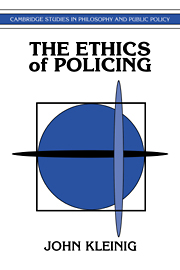Preface
Published online by Cambridge University Press: 05 June 2012
Summary
For the most part, the ethical concerns of police have been ignored by academic writers. Not entirely; though when you compare the scholarly attention given to legal ethics, medical ethics, business ethics, ethics in government, and so on, police ethics comes off very poorly. Police novels, films, documentaries, and journalistic essays often do much better (and, alas, worse) in representing and exploring the ethical dimensions of police work.
My own interest in police ethics was first stimulated in 1984, when the then Commissioner of the New South Wales Police Service, John Avery, invited me to conduct a session on police ethics for an Officer Training Conference at the Australian Police College, Manly. His invitation came at almost the same time I was unexpectedly awarded a Fulbright grant to spend a year as Scholar-in-Residence at John Jay College of Criminal Justice at the City University of New York (CUNY). Though I did not then translate my nascent interest into any extended reflection and teaching, the College nevertheless welcomed me into an environment that had close links with police work, and by the end of my time there, when I returned to Macquarie University in Australia, I was sufficiently intrigued and emboldened to offer a course in police ethics.
I was subsequently to return permanently to John Jay College in September 1986, and found myself with the now-fascinating yet daunting responsibility of preparing courses in police ethics for undergraduate, graduate, and doctoral students.
- Type
- Chapter
- Information
- The Ethics of Policing , pp. vii - viiiPublisher: Cambridge University PressPrint publication year: 1996

